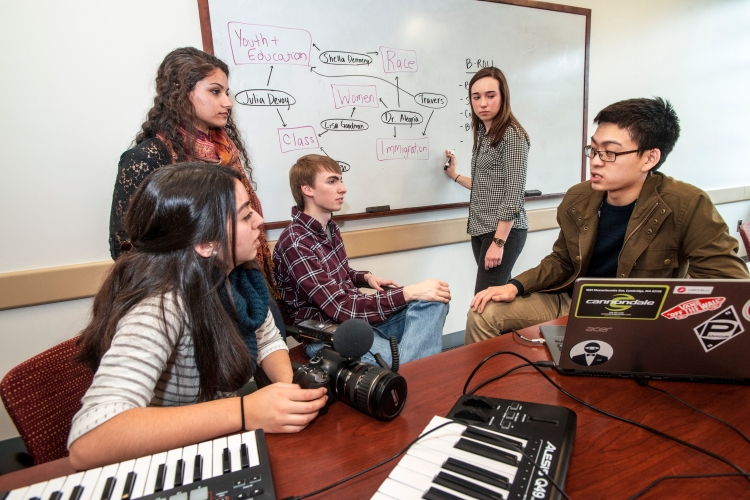
By
They knew they had a compelling story to tell, and felt the way to share it was to make a documentary – even if they didn’t really know how.
So, a group of Boston College sophomores put together a 30-minute film that explores mental health-related issues in the Boston area, with a particular focus on cultural and socioeconomic disparities that affect treatment, stigma and care.
The students, who are in the Gabelli Presidential Scholars Program (GPSP), premiered “A Boston State of Mind” Tuesday night in Higgins Hall, an event that included a discussion with some of the people interviewed in the film.
[The film is available at the project’s website, abostonstateofmind.com.]
To produce the documentary, the Presidential Scholars interviewed numerous Boston-area practitioners in the mental health care field, as well as persons who have coped with mental health problems. Woods College of Advancing Studies Interim Associate Dean David Goodman, Lynch School of Education Professor Lisa Goodman, and Kimberly Ashby, a doctoral student in counseling psychology, are among those with Boston College affiliations offering their expertise.
Creating “A Boston State of Mind” was the grand finale of the Presidential Scholars’ sophomore year social justice project, a hallmark of GPSP. Each summer following freshman year, students in the program serve at placements in and around Boston, then discuss their experiences and observations in deciding on a theme for the project.
For this group of students, the subject of mental health cropped up continually in their summer placements, at locations such as Rosie’s Place, the Suffolk County House of Corrections, Haley House and the Education Development Group.
“Mental health was a prevalent topic, and in our discussions, it emerged as a unifying theme for our project,” says Isra Hussain, a major in psychology with a minor in Arabic Studies.
“We knew so little about mental health in Boston, and assumed that – given the abundance of academic and professional resources in the area – there were less issues regarding availability and care,” says biology major Russell Simons, who is enrolled in the medical humanities minor. “But the concerns we found mirrored those in many other areas of the country.”
Among the problems cited in the documentary are the disparities in quality between private and public mental health care, and the shortage of counseling and related services in inner-city schools compared to those in suburban districts. In addition, interviewees say mental health resources too often fail to consider unique ethnic or cultural differences among patients, and how these can contribute to or exacerbate stigmas about mental illness.
“We’re by no means trying to criticize or discount the work mental health professionals do here in Boston, or elsewhere,” says Simons. “We’re trying to create more awareness of the need for greater resources that will help both those persons who struggle with mental health issues, and those who seek to aid them.”
Hussain says a conversation at the Suffolk County House of Corrections helped form her impression of the mental health question. “I spoke with someone who taught a parenting class for fathers in Suffolk. People look at these inmates and devalue them, but it was clear to this teacher that these men could have benefitted from access to counseling because of their experiences – poverty, discrimination, violence – and that they had no opportunity to let go of these. So the context in which they lived often made the prevalence of depression and other mental illnesses more defined.”
Having decided upon their project, which they titled “Unmasking Mental Health,” during the fall the students collaborated with the BC Dramatic Society’s production of Kim Rosenstock’s “Tigers Be Still” – which deals with mental health-related subjects – to host an art gallery and a “talk-back” session connected with the play. The effectiveness of the arts in conveying social justice issues thus inspired the idea to produce a documentary.
Although novices in film production – and tasks such as script-writing, lighting and sound – the sophomores were able to draw on friends and acquaintances for assistance, along with advice from Professor of Fine Arts John Michalczyk, director of Film Studies at BC. Legacy Grants from the University helped provide support for the project.
Even as they sifted through the economic, social and political aspects of their findings, the students – in their role as documentarians -– also had to be mindful of the human dimensions.
“Interviewing someone about her struggles with mental illness was a delicate situation,” explains Catherine Cole, a major in political science and Islamic Civilizations and Societies. “We wanted all the details so as to make an interesting and informative film, but we had to remember that this is her life, and that she had made a difficult decision to share her story. We had to be careful not to sensationalize or overdramatize.”
The Presidential Scholars hope that the “A Boston State of Mind” event, and its availability online, will help spur discussion about mental health issues at the University and beyond (they also plan to distribute the video to area mental health care organizations).
“It’s certainly a topic that has many dimensions, including social justice, and therefore would be of great interest to many at BC,” says Hussain.



